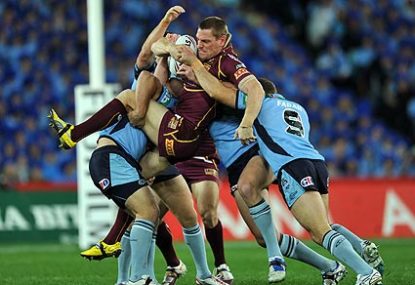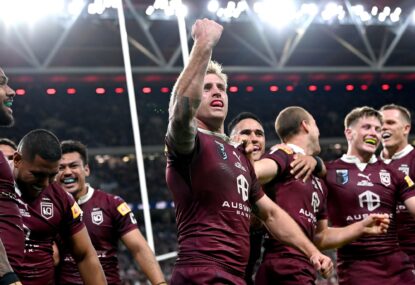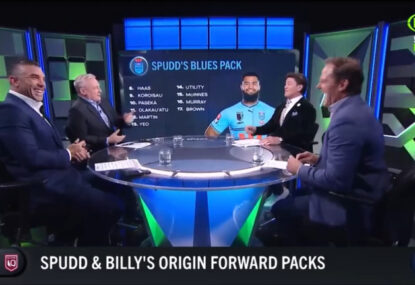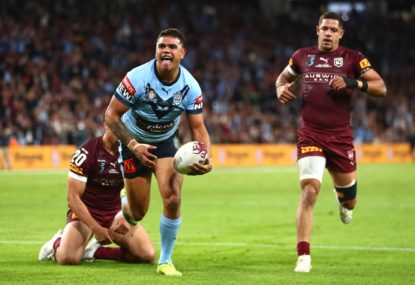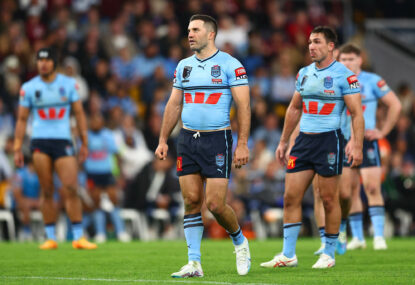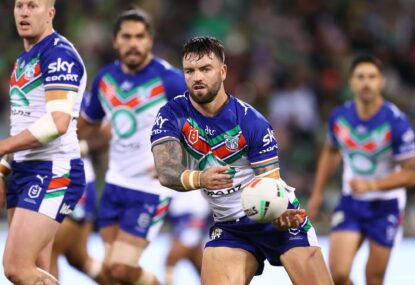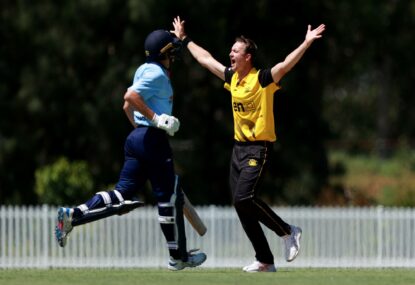With a month to go until the first State of Origin match for 2013, debate rages over who should be included in the New South Wales team this year.
No such dramas for Queensland, who for the last seven years have picked virtually the same side, only having to make changes when players are out injured or suspended.
I always go by the theory ‘New South Wales pick their team on form and that Queensland pick theirs on experience’.
It’s experience that is going to win a State of Origin series, not form.
Experience is something Queensland has had during their seven-year reign of State of Origin. It’s also something New South Wales has lacked during the same period, which coincidentally started when Andrew Johns announced his retirement from representative football.
From the victorious New South Wales team that took the field on July 6, 2005 at Suncorp Stadium in Brisbane, only Anthony Minichiello, Matt King, Matt Cooper, Timana Tahu, Braith Anasta, Luke Bailey, Danny Buderus (the last man to captain New South Wales to an Origin series victory) and Jason Ryles remain in the NRL today.
Of these players, only Tahu appears likely to return to the Origin scene this year, given his impressive form for the Newcastle Knights. But whether he gets selected is another question.
Since then, the Blues have struggled to maintain any stability in their line-up, and when they try to get a team that can actually perform, they do so for only one match.
There are players who either show their potential on their Origin debut, and there are those who crumble under the pressure of playing for their state. But New South Wales are not alone.
One bad game might not be your only Origin match, as sometimes players get stronger and learn from their mistakes, while some just give up altogether.
Take Justin Hodges as an example. He was thrown into the deep end for the Maroons when he made his Origin debut in the second game in 2002, and produced possibly the worst performance for any Origin debutant in history, throwing two in-goal passes which led directly to Blue tries (though Queensland eventually won that match).
While that will go down as one of the worst performances for any Origin debutant, Hodges has since turned into a world-class centre and a regular fixture in the Queensland Origin side.
Faith can still be kept by the team, as most debutants will show nervousness in his first Origin match.
And there are those who use their Origin debut to showcase their best talents, only to flop later on.
Jarryd Hayne made his State of Origin debut for New South Wales in 2007. He had an explosive start; close to half-time, he smothered a kick down the sideline by a Queensland player, picked up the ball, kicked it towards the try-line, regathered it and touched down for one of the greatest individual tries in Origin history.
That appeared to have won New South Wales the game, as the Blues went 18-4 up.
But in the second half he turned from hero to villain when he threw an awkward pass in defence which led to a Darren Lockyer try, thus turning the match on its head and losing the match for the Blues.
But just as Justin Hodges did when he made ‘that’ debut for Queensland in 2002, Hayne has learnt from his own disaster and has since become a superstar for New South Wales in his own right.
Another player who falls into that category is Peter Wallace. Struggling to gain a regular place in Penrith’s starting line-up in 2007, he packed his bags and headed to Brisbane in 2008, giving him the opportunity to play with Darren Lockyer in the halves.
Lockyer, though, had been coming off a serious knee injury which would ground him for most of the year, meaning he had to sit out the entire Origin series.
Wallace’s impressive transition into the Broncos’ starting line-up eventually led to him being selected for his Origin debut for New South Wales in 2008. He impressed on debut, making a line break with his first touch of the ball, setting up three tries, making 29 tackles and only making one error all match.
Such was his impressive debut he was retained for the second match, which was to be played on his normal home ground, Suncorp Stadium, in Brisbane.
Whereas the crowd would be behind him in Broncos matches, this time he would be booed.
Wallace had a less successful match, suffering an injury which would later force him out of the Origin decider, paving the way for Mitchell Pearce, in only his second year in first-grade, to make his own State of Origin debut in the final match.
Pearce was showing his potential in what appeared to be an improving Sydney Roosters side, who were at the time coached by favourite son Brad Fittler. But it was his inexperience that ultimately cost the Blues their third straight Origin series defeat, and such a gamble made by the NSW selectors backfired spectacularly.
To this day, Wallace has not played State of Origin since 2009 and Pearce continues to be a regular halfback in the Blues’ side, having not missed since game one, 2010. It wouldn’t be until game two 2011, until Pearce first experienced victory as part of the starting side.
Pearce continues to perform consistently for the Roosters, which is one of the main reasons why his club side has found form this season, despite having to switch to five-eighth to accommodate the arrival of James Maloney from the Warriors.
Despite his tough initiation into State of Origin, the Blues have continued to keep the faith in Pearcec, as evidenced by his eight match Origin streak. That was one of the first signs the Blues were starting to finally get something going, after years of trial and failure (think Wallace, Jarrod Mullen, Brett Kimmorley, Braith Anasta, Brett Finch and many others), the worst of which included being whitewashed in the 2010 series.
So dismal and ugly were the performances of the Blues that year that Aussie Home Loans decided to cease their sponsorship of the state after just one series.
A review of the shambolic and disgraced system was also carried out, ironically by a Queenslander by the name of Brian Canavan, who was instrumental in the Sydney Roosters’ early successes of the 2000s and this year.
Craig Bellamy, who at the time had to coach a club side that could not play for premiership points that year, was the biggest victim of the clean-out, as he paid the price for the Blues’ dismal performances in 2010.
Laurie Daley was also sacked from the selection panel that picked underperforming players to play in the side, though he has since returned to the system as the head coach.
Daley this year has a huge task ahead of him, as he takes over from Ricky Stuart, who, despite being unable to stop the shield heading north of the border in his two years at the helm, restored the confidence and pride in the NSW players. Stuart remains the last man to coach New South Wales to an Origin series victory, in 2005.
There is already debate as to who should be the halves pairing for the first State of Origin match.
Mitchell Pearce and James Maloney should be the first choice halves, given how well they have played in a resurgent Sydney Roosters side this season.
Of all the active halfbacks to have played for New South Wales, Pearce is the most experienced, with eight Origins to his name. Peter Wallace has four Origins, while Jarrod Mullen, who was famously thrown into the deep end in the same match in which Jarryd Hayne made his debut, has played just one Origin.
If there is one experienced player the Blues must choose at fullback, it’s Anthony Minichiello. It had been a while since he last played Origin when he was chosen in the second game of the 2011 series.
His selection revived a winning combination from the past and reunited him with Ricky Stuart, who for the early part of his career was his club coach at the Roosters.
The move paid off very well, as Minichiello contributed to a morale-boosting New South Wales victory. He would be retained for the third game, but the form he showed in the second game diminished as the Blues were beaten by the Maroons who on that night claimed their sixth consecutive Origin series.
Timana Tahu I feel is a must, given his experience in big matches. He would form a lethal centre pairing with Michael Jennings, who is enjoying a form resurgence at the Sydney Roosters.
If he was to be selected, it would be Tahu’s first Origin since a public spat with Andrew Johns led to his exit from the camp during the train wreck that was the 2010 series.
Paul Gallen is the heart and soul of the state and his input will be very valuable for the Blues this season. Just as the Melbourne Storm’s Queensland representatives did during their 2010 season, in which they could not compete for premiership points, Gallen could also possibly use the Origin stage to forget about the ASADA scandal that is engulfing his club at the moment, and try to inspire his state.
Despite the lack of success in this New South Wales side, and the fact they came so close in the last two years only to come up empty-handed, this Blues side has the team to finally end seven years of misery.
Whether they can actually do it against a Queensland side that boasts more experience will be the challenge.
By winning this year’s State of Origin series, New South Wales can actually build some experience of its own and use it to create their own era of success.
However, Queensland will be keen on extending their streak and they will leave no stone unturned in their quest to eventually make it ten straight Origin series.





























































































